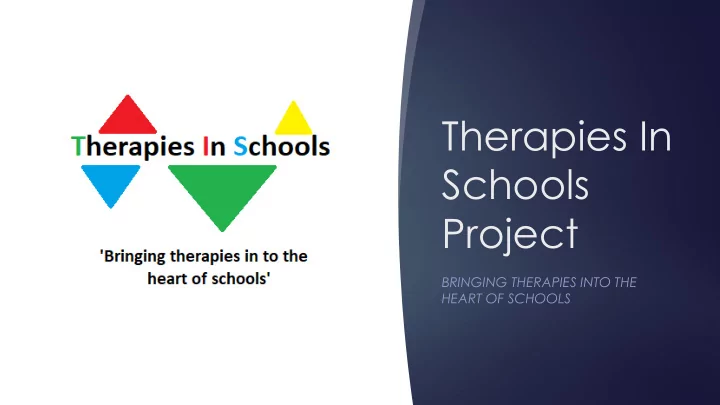

Therapies In Schools Project BRINGING THERAPIES INTO THE HEART OF SCHOOLS
Why TIS…… Losing Tribunals due to lack of theraptic • input. Non maintained schools were able to sell • packages as all therapists in house. We need The TIS Story to compete in this world. Having to use private therapies to plug the • gaps. Private therapists did not have knowledge • about the school, its students or their parents. No continuity in care. NHS therapists felt like they were firefighting. • Lack the autonomy to choose and deliver a service they feel fits the child's needs. We were not meeting the needs of our • students or their families.
The TIS Family: Parent or Carer Teachers SENCO Supporting Therapy Staff Manager child Therapist/s Champions NHS & TIS
TIS Modular Training Physical Sensory Life Skills Support Processing Central and Peripharal Typical Development 8 Sensory Systems Nervous System Occupational Performance Biomechanics Sensory Processing and associated Skills Regulation and Sensory Typical Development Activity Analysis Preferences Atypical Development Sensory Support Plans Strategies to Teach Life Skills TIS Mandatory TIS Accredited TIS Accredited Training for all Enhanced Sensory Friendly Further Steps into Activity Use of orthotics Champion Environments staff within first Employee Analysis 6 months of Respiratory System Using Sensory Rooms Goal Setting employment Level 1 Application of Orthotics and Classroom Strategies and Further Strategies to Teach Postural equipment Regulation Programmes Level 1 Life Skills Using Equipment to Aid Postural Management Making Sensory Support Plans Level 2 Independence Level 1 Referral for Intervention Referral for Interventions Referral for Intervetion Level 2 Level 3 Observation Observation Observation
Accreditation All education staff across 3 schools have • Level 1 foundation training in all 3 streams Training For All during inset days. We have trained over 200 staff. Level 2 training will roll out on 23 rd November • with 60 staff being trained. Is in the process of being granted • accreditation. All trainees are given a workbook to work • through throughout their training . All attendees were audited with evaluation • forms to assess how the training affected their confidence level.
Impact of training Since the training staff have been observed • to be putting more strategies in place within in schools the classrooms. E.g. sensory thermometers and life skill groups Decrease in the number of inappropriate • referrals to the NHS. Increase in class staff trouble shooting • independently and seeking their own solutions. An increase in understanding of the roles of • Occupational Therapists and Physiotherapists TIS therapists being able to spend time in the • classrooms and being part of staff team. Supported teaching staff to embed • therapeutic aims into the curriculum.
More TIS in Schools Water Skills Programme • Posture passports for complex disability • Sensory screening pilot • TIS support the teachers to embed therapeutic • goals into the holistic curriculum Therapist led groups • TIS surgeries • Attendance at PATH, MDT, TAF and Annual • Review meetings Part of the school family – contribution to • newsletters and school social media Supporting schools with parents evenings and • parent tours Sensory circuits training. • The Alert Programme. •
Within Schools Comments "Since the TIS project started the most significant thing for me personally has been having time to talk and work closely alongside the therapists, all of whom have been very approachable.....By sharing our school curriculum and way of working with the therapists we have been able to set targets together having a better understanding of where education and health approaches come from - passionate about our roles and being able to combine approaches will transform how we support our children moving forward." Teacher at Palatine
Supporting all carers Attendance at meetings (e.g. TAF, PATH, AR, • and families MDT) Available at coffee mornings and parent • evenings Home Visits (Non term time and home visits) • Transition Document • Collaborative goal setting with family • Offer parents level 1 in all modules • Assist in school to school transitions • Flexible communication • Linked in with the parent carer forum • Supporting and liaising with external agencies • Build confidence of parents in the schools • ability to competently meet their child's therapeutic needs.
Comments “I felt the training was extremely useful Supporting all carers both as a parent and as a member of staff - it provided a huge insight into the types and families of difficulties the children can have from a physical and sensory point of view and how we can help them overcome some of their barriers. It has been great putting some of it into practise with the children in the last few days! I would have loved the chance to learn about this a long time ago, especially with regard to physical development as it is so relevant to J. So I definitely think other parents would benefit from the training...” Parent at Palatine
TIS, NHS and schools working together TIS enables schools to prioritise • children for caseload If a child is on NHS caseload-TIS • compliment and support current plans Liaise directly with therapists for • unified outcomes TIS offers adhoc and flexible • support when we are available Capped but flexible caseload. • Liaise and support social services • where needed.
Building the future with TIS Being able to deliver a service that is • flexible enough to meet the ever changing needs of the students. Parent confidence in local provision will • continue to build Supporting staff to continue to train and • TIS strategy becomes part of school culture Modular training becomes entrenched in • school mandatory training Unified working with NHS and external • agencies strengthens and develops Potential to roll out across the county • Modular training could be ‘sold’ to • mainstream and other special schools so may become a source of revenue A long term goal of reduction in ‘out of • area’ placements and costly and lengthy tribunals may be negated.
Thank you for listening….
Recommend
More recommend